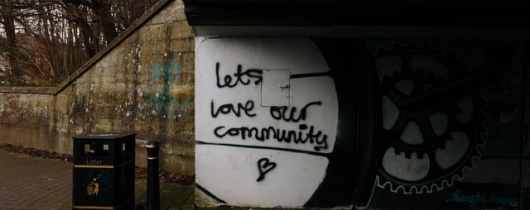Harm or Healing | Daño o Curación

2 Kings 25:1-12; Matthew 8:1-4
I recently returned to Chicago for a few days of meetings and visits with family in Milwaukee. It was my first time back since the riots or uprisings that occurred in the wake of the killings of more Black men and women by law enforcement officers. As I jogged around the neighborhood, I was startled by the number of stores that were boarded up following several nights of demonstrations and looting.
My mind turned to the images of Jerusalem in today’s first reading: the palace, the temple and all other large buildings destroyed, a city with all but its poorest people and “essential workers” like vine dressers and farmers left behind.
Chicago isn’t Jerusalem during the time of the Babylonian siege, destruction, and exile. But there are several neighborhoods that have never experienced a recovery after the riots or uprisings of two generations ago. They have large numbers of low wage “essential workers,” as well as those who are unemployed. They, too, burned and suffered looting; and last weekend they were the epicenter of over 100 shootings. 15 of those shootings were fatal, and five of the victims were children. None of them involved police officers.
The people of Israel had to wait three generations to return to Jerusalem and begin to rebuild it. How many generations will it take for us to rebuild and revitalize our cities—not just downtowns or a few neighborhoods, but all neighborhoods for all people?
The leper who approached Jesus after his Sermon on the Mount said, “Lord, if you wish, you can make me clean.” Jesus not only affirmed that he wanted the man to be healed, but he also reached out and touched him to do it. He risked becoming unclean himself to help someone who was suffering.
Anyone who cares about the condition of our cities and all the people who live in them, especially those who are poor and often ignored, needs to ask themselves what they are willing to risk in order to allow the healing grace that can only come from God to work. The Lord wants us to be clean—of institutional racism, division, violence, historical trauma, instant gratification, greed, indifference, ignorance, and all the other things that plague us and our communities. It will take generations of work to cooperate with God’s grace; but it’s either that or more generations of suffering.
***
2 Reyes 25:1-12; Mateo 8:1-4
Recientemente regresé a Chicago para unos días de reuniones y visitas con la familia en Milwaukee. Era la primera vez que regresaba desde los disturbios o motines que se produjeron a raíz de los asesinatos de más hombres y mujeres negros por parte de los agentes de la ley. Mientras corría por el vecindario, me sorprendió la cantidad de tiendas que fueron clausuradas luego de varias noches de manifestaciones y saqueos.
Mi mente se volvió hacia las imágenes de Jerusalén en la primera lectura de hoy: el palacio, el templo y todos los demás grandes edificios destruidos, una ciudad con toda la gente excepto los más pobres y los "trabajadores esenciales" como los viñateros y los granjeros que quedaron atrás.
Chicago no es Jerusalén en la época del asedio, destrucción y exilio babilónico. Pero hay varios vecindarios que nunca han experimentado una recuperación después de las revueltas o levantamientos de hace dos generaciones. Tienen un gran número de "trabajadores esenciales" con bajos salarios, así como aquellos que están desempleados. Ellos también se quemaron y sufrieron saqueos; y el pasado fin de semana fueron el epicentro de más de 100 tiroteos. 15 de esos tiroteos fueron fatales, y cinco de las víctimas fueron niños. En ninguno de ellos participaron oficiales de policía.
El pueblo de Israel tuvo que esperar tres generaciones para volver a Jerusalén y comenzar a reconstruirla. ¿Cuántas generaciones nos llevará reconstruir y revitalizar nuestras ciudades, no sólo en los centros o en unos pocos barrios, sino en todos los barrios para todas las personas?
El leproso que se acercó a Jesús después de su Sermón del Monte dijo: "Señor, si quieres, puedes limpiarme". Jesús no sólo afirmó que quería que el hombre se curara, sino que también lo tocó para hacerlo. Se arriesgó a volverse impuro para ayudar a alguien que estaba sufriendo.
Cualquiera que se preocupe por la condición de nuestras ciudades y toda la gente que vive en ellas, especialmente aquellos que son pobres y a menudo ignorados, necesitan preguntarse a sí mismos qué están dispuestos a arriesgar para permitir que la gracia sanadora que sólo puede venir de Dios trabaje. El Señor quiere que estemos limpios de racismo institucional, división, violencia, trauma histórico, gratificación instantánea, codicia, indiferencia, ignorancia y todas las demás cosas que nos asolan a nosotros y a nuestras comunidades. Se necesitarán generaciones de trabajo para cooperar con la gracia de Dios; pero es eso o más generaciones de sufrimiento.
- Capuchin Friar John Celichowski




